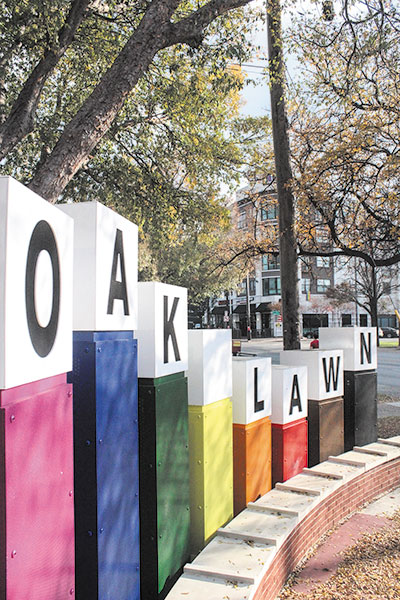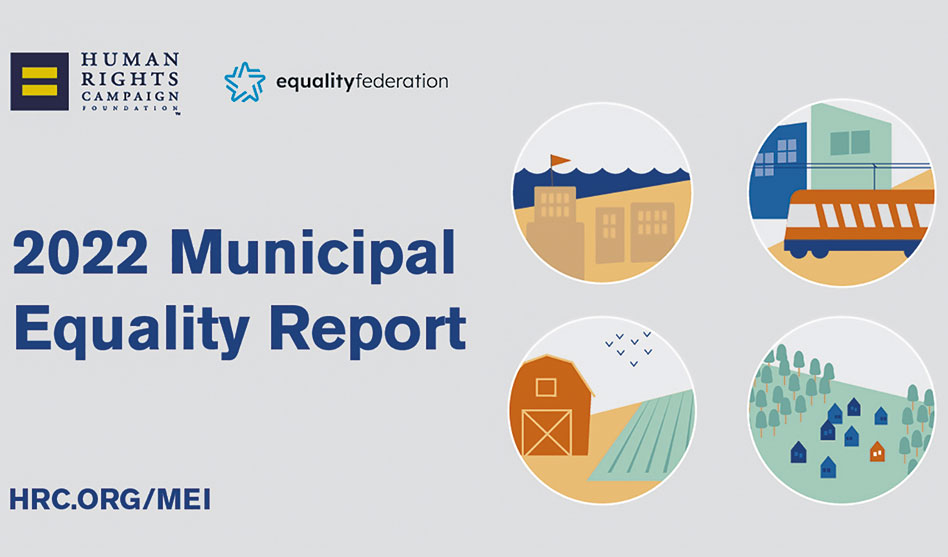HRC’s annual Municipal Equality Index shows 5 Texas cities got top scores
From Staff Reports
The Human Rights Campaign has released its 2022 Municipal Equality Index, and 25 Texas cities have made the list, although only 10 of the 25 scored better than 50 percent. Of those 10, eight were among the state’s 10 largest cities.
Texas cities receiving a top score of 100 were Dallas, Fort Worth, Arlington, Austin and San Antonio. Houston, the largest city in Texas, scored 73, while Denton came in at 94. Also scoring about 50 percent were Plano at 64, Irving at 59, Corpus Christi at 58 and Waco at 56.
Both Brownsville at Mesquite scored a 46, followed by Amarillo at 43, Grand Prairie at 38 and Lubbock and McKinney at 36.
Killen scored 29, followed by Pasadena at 26, Garland at 24, and College Station, Laredo and Round Rock each with 22. McAllen finished at the bottom of the pack with a mere 17 points.
 Cities in the MEI are graded based on five categories:
Cities in the MEI are graded based on five categories:
• Nondiscrimination laws, evaluating whether discrimination on the basis of sexual orientation and gender identity is prohibited by the city, county or state in areas of employment, housing and public accommodations.
• The municipality as an employer, grading whether the city offers equivalent benefits and protections to LGBTQ employees, awards contracts to fair-minded businesses and takes steps to ensure an inclusive workplace, thus treating LGBTQ employees equally.
• Municipal services, assessing the efforts of the city to ensure LGBTQ constituents are included in city services and programs.
• Law enforcement, assessing whether enforcement of the law within the city includes responsible reporting of hate crimes and engaging with the LGBTQ community in a thoughtful and respectful way.
• Leadership on LGBTQ equality, measuring the city leadership’s commitment to fully include the LGBTQ community and to advocate for full equality.
Each category includes flex points that can be awarded and can lift a city’s score to 100. No scores over 100 are awarded.
Dallas received 26 of 30 possible points in the nondiscrimination law category, and 28 of 28 possible points in the municipality as an employer category, plus one flex point for offering city employees domestic partner benefits. Dallas lost five points in the municipal services category for not having a human rights commission but picked up six flex points for providing services and support to LGBTQ youth, to LGBTQ people experiencing homelessness, LGBTQ older adults and the transgender community. Dallas missed out on flex points by not providing city services and support to people living with HIV/AIDS.
Under the law enforcement category, Dallas got 10 points for having an LGBTQ police liaison officer and 12 points for having reported hate crimes statistics to the FBI in 2019, for the total possible 22 points.
And under leadership on LGBTQ equality, Dallas again scored the total points possible — eight — for having leadership that publicly supports equality and advocates for legislation and policy supporting equality. Dallas also got the total number of flex points possible in the last category, for including openly LGBTQ elected or appointed municipal leaders and for having tested the limits of restrictive state laws.
That left the city with 91 out of 100 possible standard points, plus 12 out of a possible 22 flex points.
Across the river in Fort Worth, the city scored 30 of 30 possible points in the nondiscrimination laws category, but only 20 out of 28 points under the municipality as an employer category, losing points for not having trans-inclusive healthcare benefits and not having policies ensuring an inclusive workplace. The city did pick up a flex point in that category for having domestic partner benefits available to city employees.
Fort Worth earned 12 out of 12 points under municipal services and added flex points for having a youth bullying prevention policy and for providing services and support to older LGBTQ people and to people living with HIV/AIDS. The city received the full 22 points possible in the law enforcement category and received seven of eight points in the category of leadership’s support for equality, plus three flex points for testing the limits of restrictive state laws.
Fort Worth ended with 91 out of 100 standard points and nine out of 22 possible flex points.
Arlington lost points for not having trans-inclusive healthcare benefits
for employees and for not having an enforcement mechanism built into its Human Rights Commission. But the city earned flex points for having a youth bullying prevention policy for city services, and for providing services and support to LGBTQ youth, LGBTQ people experiencing homelessness and people living with HIV/AIDS, and for having openly LGBTQ elected or appointed municipal officials.
Arlington ended with 92 out of 100 standard points and 10 out of 22 possible flex points. Denton lost four out of 30 points in the nondiscrimination laws category, six out of 28 in the municipality as an employer category (all six for not offering trans-inclusive healthcare) and two out of 12 points under municipal services for not having an enforcement mechanism in its human rights commission. But the city received flex points for including a youth bullying policy for city services, providing city services to LGBTQ youth and having an openly LGBTQ elected or appointed city official. That gave the city 88 out of 100 standard points and six out of 22 flex points.
Plano lost points in each category, earning no points at all in the municipal services category. The city earned its single flex point for offering domestic partner benefits for city employees. Irving, the only other Metroplex city scoring about 50, lost points in four of five categories but scored the full 22 points in the law enforcement category. Irving earned no flex points.
Garland, the lowest-scoring city in the Metroplex, earned 10 points under nondiscrimination laws, thanks to state-level laws, and 12 points for reporting hate crime statistics to the FBI. McKinney got the 10 state law-level points under the nondiscrimination law category, 14 points under municipality as an employer for having city nondiscrimination laws and 12 points for reporting hate crime statistics.
Grand Prairie got the standard 10 out of 10 for state nondiscrimination laws, 14 for a city nondiscrimination in employment policy, two for having an inclusive workplace and 12 points for reporting hate crime stats to the FBI. And last among the Metroplex cities, Mesquite also got the 10 points based on state nondiscrimination laws, 14 points for a city nondiscrimination policy, five points for having an LGBTQ liaison in the city executive’s office, 12 points for reporting hate crime stats to the FBI and a total of three points based on city leadership’s public support and advocacy for LGBTQ equality.
















